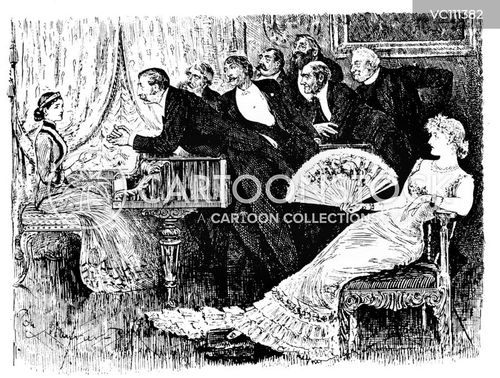 This book, with its pretty cover and its intriguing title, has been tempting me for months on the shelves of bookstores and libraries. I have so far resisted it until I finally succumbed, though I had no great hopes of finishing it. Thankfully, I did, or just barely managed to.
This book, with its pretty cover and its intriguing title, has been tempting me for months on the shelves of bookstores and libraries. I have so far resisted it until I finally succumbed, though I had no great hopes of finishing it. Thankfully, I did, or just barely managed to.
On the cover of the book is written a quote from a review by the Washington Post, and one word in it resonated over and over again as I read this story: panoramic. This book is indeed a large-scale view of one woman’s birth, growth and life. It briefly delves into her own father’s boisterous life as a street urchin-type boy in England, to his growth into a man and how a series of bold decisions made his fortune and secured his position as one of the richest men in America. Nevertheless, the true heroine of the book is his only daughter, Alma Whittaker. Born into a world of botany, with a daring and preposterous father, and an intelligent mother with almost modernist thinking, Alma’s intellect is honed from a young age.
What I particularly like about Alma Whittaker and the plot revolving around her is how flawed she is. Maybe I’ve been reading too many nonsensical books lately with the usual plot line of a heroine who sets out to accomplish what she never thought she could before. Success is already a somewhat pre-determined destination, reading the book is merely to find out how she got there. With The Signature of All Things, though, this is not so. Despite her vast intellect, wealth and a little bit of self-centeredness, Alma Whittaker is far from capable of making the right decisions at the right time – just as we all are in the real world. She, like us, has her own needs and wants and goals, and also like us, she may sometimes unwittingly be blind to others in order to accomplish what she’d like. The fact that more than half of the book takes place when Alma is nearing her 50’s and has passed her menopause is also a testament to the fact that people do not necessarily become wise old sages with age, nor does their propensity to make huge mistakes, especially in areas where they have had no experience, decrease any. Without being villainous or unlikeable in the least, Alma still manages to screw up her life, and spend her time trying to find closure and work things out. But that’s OK, because that’s what happens in real life too.
I’m tired of heroines in most books only existing between the ages of 20 – 40. It’s like life doesn’t exist anymore after you get married, or after you turn 40. It’s like after 40 you should just be resigned to a life of stagnation and going downhill. I like that Alma Whittaker does not follow that typical storyline. She spends her fertile, adult years from the age of 26 to 48 simply studying botany and engaging in nothing else. What is usually the most exciting period in life for most of these fictional heroines is one of drudgery and routine clockwork for Alma. Her life takes a turn at the age of 48 when she meets a man – and while he does change her life, he does not necessarily come into it simply to sweep her off her feet, and have their relationship follow the typical process. I like that this story has a character who shows that life still exists after the age of 40, and one does not need to surrender to old age. I like that it tells that even after the age of 40, people are still people; they are still clever in their own ways, foolish in their own ways, the undesirable traits that they possessed in their youth may still be persistently present, as would the desirable. They (especially women) may still be struck with brilliant ideas and embark on the road to attaining unforetold achievements, or they may embark on an epic adventure across the globe, learning more about the world, themselves and the human condition along the way. Too many books with heroines center around the narrow age range of 20 – 40, which I feel inevitably encourages a thinking that once a woman hits 40, her life is pretty much over. Gilbert rebels against that, and I am thankful for it.
There is a luxuriant background of the emerging sciences in the Victorian period, and props to Gilbert for having done all this research to make this background solid and realistic. All too often, I have read books where characters claim to be experts in a certain field but there is no allusion to any detail of this field besides some passing, superficial facts that does little to elucidate exactly how ‘expert’ these characters are. This, thankfully, does not happen in The Signature of All Things. To adapt a phrase from a reviewer on Goodreads, this book felt like part-adventure, part-textbook and part-philosophy. The textbook parts comes in strongly whenever the subject of botany arises. I can see some finding these passages tedious and dry, but personally I found these passages to be interesting, and even essential in setting up the atmosphere of the book, drenching it in botanical discoveries, Latin names of plants and so on.
True to the blurb on the back cover, there is also a significant portion of the book dedicated to addressing religion, and the various ways people practise it. While some authors may skim past religion or cut it out of the book all together, I like that Gilbert gave religion its due presence. In the 1800s, religion constituted a huge part of how society worked, and how people made decisions. Whether or not in the modern context one agreed with the views and opinions of the characters involved here, I think religion would still realistically play a huge role in any character’s life, if they were purported to live in 1800s Europe.
Some found Gilbert’s writing rambling. I did not find it so, until possibly the last 70 pages which I skimmed through very quickly. The book is a hefty 600+ pages, and by the time I reached around page 530+, I was running out of steam. I think the last two parts of the book could’ve been condensed into one, and made more concise. Still, though, it illustrated an interesting and exotic picture of Tahiti island life, and elucidated on some Tahitian customs and beliefs which were new to me.
All in all, I enjoyed this book although I would’ve enjoyed it more if it had been just a little shorter. I love details and the setting up of extravagant backgrounds, but there was just a bit too much of it in this book. This is, however, preferable to the reverse. I generally enjoyed the characters, although would’ve liked to have had Alma and Ambrose’s relationship explored more deeply, as well as more backstory to characters like Retta, Prudence and George. This is a sprawling work chock full of not only botany and science, but also religion and the mystic. It is a beautifully detailed panorama, centering around a realistic and believable main character.





